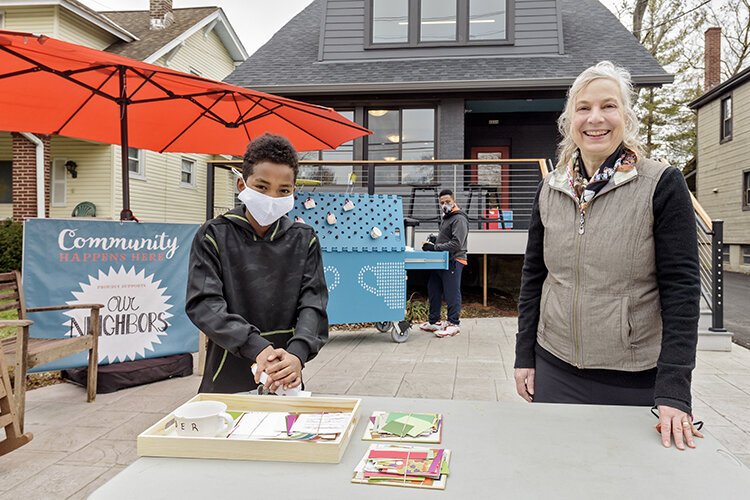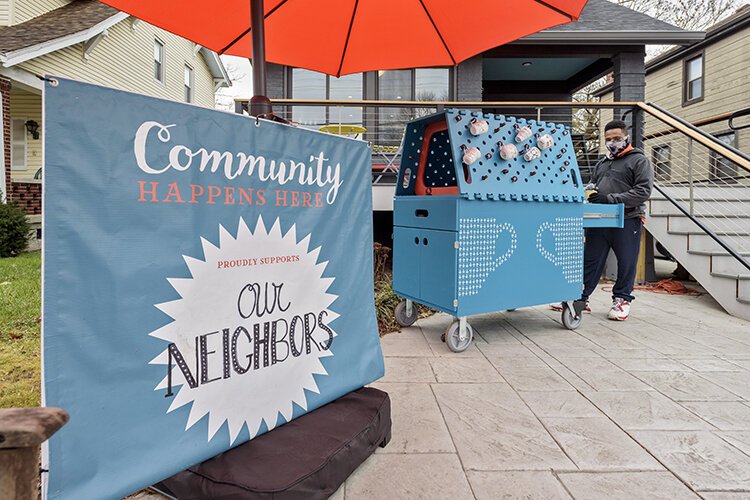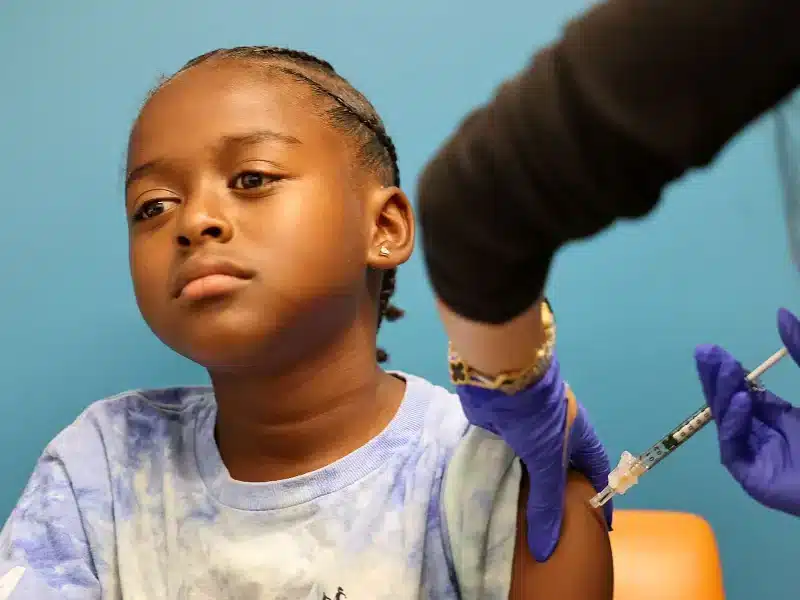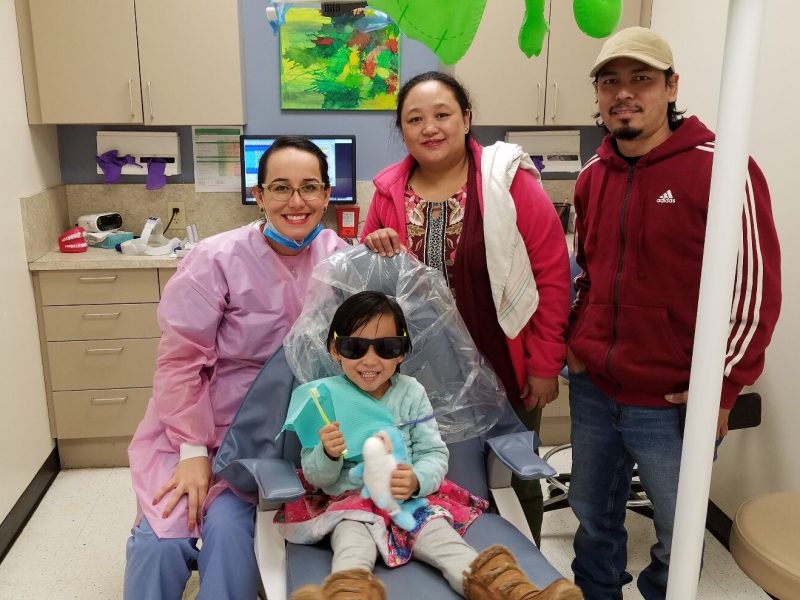What happens here: Conversations. Connections. Community.
When Ruth Anne Wolfe began fulfilling her vision to bring people from all walks of life together, she started on the sidewalk.
Ruth Anne Wolfe is walking the walk.
She’s been working to enact change on a hyperlocal level for years, starting with her involvement in the transition of Pleasant Ridge Elementary to Pleasant Ridge Montessori (PRM) more than 10 years ago.
Her latest venture, Community Happens Here, started in May of 2017, when she bought an abandoned house across from the Pleasant Ridge Library, right in the heart of town.
From the start, Wolfe’s been hosting free, outdoor activities — Sidewalk Hospitality — for the past three summers, which she extended in 2020 before it got too cold.
In September, she hosted her first community event between the police and residents.
“We gathered 20 people at our space, four of them hardworking, thoughtful police officers and 16 of them teens, people of color, committed neighbors, friends, and strangers. We started a deep, connected conversation with the help of a gifted facilitator. We concentrated on connection, on individual stories, in small groups of three and four,” she said in a Facebook post.
Now, after years of construction and waiting on an occupancy permit, the space is open (with COVID-safe rules in place).
Wolfe stands on the sidewalk as cars rush by, raising her voice to explain her mission.
“This is me — white privilege, right here — I’m going to stand in the gap and I’m going to say, ‘Here I am. Talk to me.’”
“The idea is connection and conversation over differences,” she continues. “We’re trying to connect across differences. So to do that, we must start at the sidewalk.”
She sweeps her arm around, noting that the location of her social enterprise is at a “crossover” point in Pleasant Ridge, in the middle of where the wealthier homes of Grand Vista, across from low-income apartments, the library, and close to Sunoco, a site of criminal activity over the past few years.
“Every one of our institutions has to turn inside out,” she says. “We [as individuals] have to turn inside out. If we cannot start talking, we are doomed.”
Her next step in forming community is to bring out a cart lined with coffee cups to an area where people can sit outside and chat. Wolfe calls it the “intermediary between the public to start the conversation.”
A small deck out front has windows that open into the café, allowing visitors to get drinks without going inside. (This plan was always in place but is particularly convenient right now.)
Inside, the small, comfortable, bright home has a variety of community spaces. The first thing you see is a counter and small kitchen area with barista equipment, where teenagers are trained as baristas as part of a youth entrepreneurship program.
Wolfe likes to call it “the hundred ways to pay café.”
Although they accept cash, they more commonly offer drinks in the form of trade. She’s got Montessori-style work stations set up where you can create something in exchange for a beverage. Other trades include being a helper. Did you ride the bus instead of drive? That’s good for the environment. All ages are welcome and capable of contributing, she says, whether you’re 3 or 50 or 100.
“Any disenfranchised person has no reason to walk in. I’m just trying to make this place level and give and receive gifts as possible,” she says. “[It’s] not charity, not the market, just an exchange of gifts so when you work here, your giving back to the community. When you donate here, you can give back to the community.”
Her goal is to connect people across all ages, races, religions, and economic divides, which sounds daunting until she breaks it down on a very basic level: communication. A sign out front says as much: “We’re here. Let’s talk. Free hot drinks.”
She says quite a few skeptical people have walked and left connected to someone new.
“There’s a method to it,” she says. “An activity to break the barriers, teaching each other how to talk, the first step of the conversation. First, I’m going to get to know you, then I introduce you to the next person.”
“Community is not place, it is a portal between us and we have to stand in that gap daily and create community,” she continues. “For four years, little by little, I have been creating community, trying to make it happen and make place, but now we have a nice comfortable place that makes it easier.”
Grassroots Change
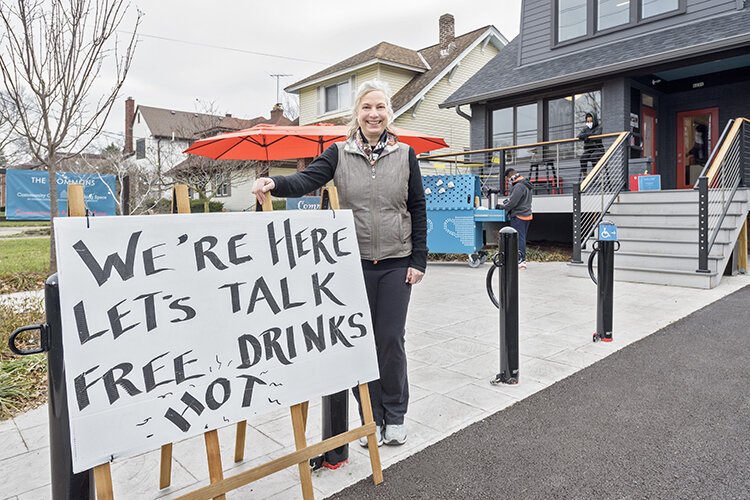
For Wolfe, “community” didn’t change much during the pandemic.
Once a month, people have been invited to come, connect, and enjoy something free, like hot chocolate, S’mores, or shaved ice made by the recipient peddling a bicycle to create the energy to shave the ice.
It is, what she calls, “a rhythm of community.” Each month, Wolfe tries to offer one meaningful conversation, one community event, one professional development meeting, and one youth entrepreneurship.
Her original idea for a community gathering space came about when she realized that the diverse students of PRM ended up re-segregated as they went off to different middle and high schools. The events of 2020 — and the beginning of 2021 — have made her more determined to create positive connections. However, her heart is still with the young people in our community.
When it’s safe, Wolfe hopes to do some after-school activities (although they still need funding for that) and offer up a space for working parents to meet their kids at the halfway point between home and school. The main coworking space is upstairs, with a beautiful view of the library.
“Instead of PRM kids leaving 6th and re-segregating, they come here and stay friends,” she says. “If I can hold onto those kids and pull in those parents, we start finding a place where it’s a little more comfortable to say the first words, to make the first gesture.”
As for the kids? They are so occupied that they don’t even pull out their phones.
“I don’t have to have a cell phone rule because I am keeping them occupied,” she says. “They must have purpose. We long for something to do. The pitcher cries for water to carry and a person for work that is real. Our children want work. What they want is skill, purpose, real life to be in front of them.”
Community Happens Here hosts a variety of (safe) in-person and Zoom programs. Tonight, January 12th, from 7–8:30 p.m., Ruth Anne Wolfe will be sharing her story about how she got started. Visit the website to register.

